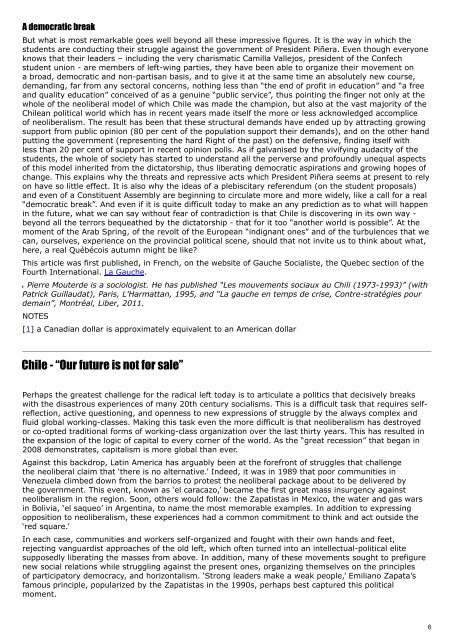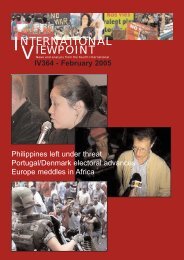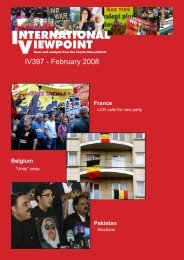here - International Viewpoint
here - International Viewpoint
here - International Viewpoint
You also want an ePaper? Increase the reach of your titles
YUMPU automatically turns print PDFs into web optimized ePapers that Google loves.
A democratic break<br />
But what is most remarkable goes well beyond all these impressive figures. It is the way in which the<br />
students are conducting their struggle against the government of President Piñera. Even though everyone<br />
knows that their leaders – including the very charismatic Camilla Vallejos, president of the Confech<br />
student union - are members of left-wing parties, they have been able to organize their movement on<br />
a broad, democratic and non-partisan basis, and to give it at the same time an absolutely new course,<br />
demanding, far from any sectoral concerns, nothing less than “the end of profit in education” and “a free<br />
and quality education” conceived of as a genuine “public service”, thus pointing the finger not only at the<br />
whole of the neoliberal model of which Chile was made the champion, but also at the vast majority of the<br />
Chilean political world which has in recent years made itself the more or less acknowledged accomplice<br />
of neoliberalism. The result has been that these structural demands have ended up by attracting growing<br />
support from public opinion (80 per cent of the population support their demands), and on the other hand<br />
putting the government (representing the hard Right of the past) on the defensive, finding itself with<br />
less than 20 per cent of support in recent opinion polls. As if galvanised by the vivifying audacity of the<br />
students, the whole of society has started to understand all the perverse and profoundly unequal aspects<br />
of this model inherited from the dictatorship, thus liberating democratic aspirations and growing hopes of<br />
change. This explains why the threats and repressive acts which President Piñera seems at present to rely<br />
on have so little effect. It is also why the ideas of a plebiscitary referendum (on the student proposals)<br />
and even of a Constituent Assembly are beginning to circulate more and more widely, like a call for a real<br />
“democratic break”. And even if it is quite difficult today to make an any prediction as to what will happen<br />
in the future, what we can say without fear of contradiction is that Chile is discovering in its own way -<br />
beyond all the terrors bequeathed by the dictatorship - that for it too “another world is possible”. At the<br />
moment of the Arab Spring, of the revolt of the European “indignant ones” and of the turbulences that we<br />
can, ourselves, experience on the provincial political scene, should that not invite us to think about what,<br />
<strong>here</strong>, a real Québécois autumn might be like?<br />
This article was first published, in French, on the website of Gauche Socialiste, the Quebec section of the<br />
Fourth <strong>International</strong>. La Gauche.<br />
Pierre Mouterde is a sociologist. He has published “Les mouvements sociaux au Chili (1973-1993)” (with<br />
Patrick Guillaudat), Paris, L’Harmattan, 1995, and “La gauche en temps de crise, Contre-stratégies pour<br />
demain”, Montréal, Liber, 2011.<br />
NOTES<br />
[1] a Canadian dollar is approximately equivalent to an American dollar<br />
Chile - “Our future is not for sale”<br />
Perhaps the greatest challenge for the radical left today is to articulate a politics that decisively breaks<br />
with the disastrous experiences of many 20th century socialisms. This is a difficult task that requires selfreflection,<br />
active questioning, and openness to new expressions of struggle by the always complex and<br />
fluid global working-classes. Making this task even the more difficult is that neoliberalism has destroyed<br />
or co-opted traditional forms of working-class organization over the last thirty years. This has resulted in<br />
the expansion of the logic of capital to every corner of the world. As the “great recession” that began in<br />
2008 demonstrates, capitalism is more global than ever.<br />
Against this backdrop, Latin America has arguably been at the forefront of struggles that challenge<br />
the neoliberal claim that ‘t<strong>here</strong> is no alternative.’ Indeed, it was in 1989 that poor communities in<br />
Venezuela climbed down from the barrios to protest the neoliberal package about to be delivered by<br />
the government. This event, known as ‘el caracazo,’ became the first great mass insurgency against<br />
neoliberalism in the region. Soon, others would follow: the Zapatistas in Mexico, the water and gas wars<br />
in Bolivia, ‘el saqueo’ in Argentina, to name the most memorable examples. In addition to expressing<br />
opposition to neoliberalism, these experiences had a common commitment to think and act outside the<br />
‘red square.’<br />
In each case, communities and workers self-organized and fought with their own hands and feet,<br />
rejecting vanguardist approaches of the old left, which often turned into an intellectual-political elite<br />
supposedly liberating the masses from above. In addition, many of these movements sought to prefigure<br />
new social relations while struggling against the present ones, organizing themselves on the principles<br />
of participatory democracy, and horizontalism. ‘Strong leaders make a weak people,’ Emiliano Zapata’s<br />
famous principle, popularized by the Zapatistas in the 1990s, perhaps best captured this political<br />
moment.<br />
6









